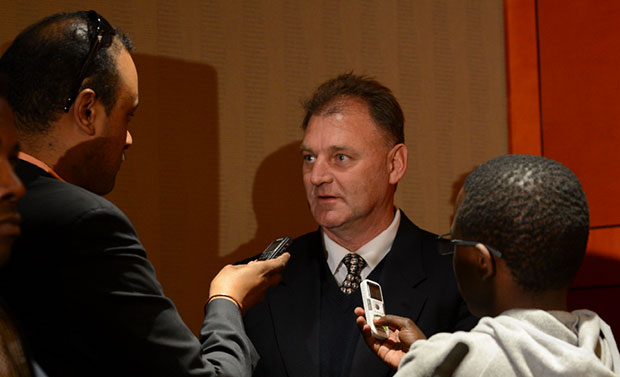Get to know a little bit more about Proteas assistant coach Adrian Birrell. By Ryan Vrede.
Adrian Birrell and Russell Domingo were enjoying a coffee at their local golf club when they first informally discussed the former’s career path. Gary Kirsten was poised to step down as national coach and Domingo knew he would succeed him. That created a void in the management team and Birrell was his man. As far as job offers for a position of that calibre go, it was unusual. But Domingo’s faith in Birrell had been forged over years of professional association and Birrell coaching the Proteas chief in his junior playing days.
The appointment wasn’t universally praised, however. Indeed, there was widespread criticism of the installation of a relative unknown to such a key position with one the world’s best Test teams.
The despair Kirsten’s resignation caused had much to do with this. Domingo’s aptitude compared to Kirsten’s was already being questioned. Then he fuelled the discontent by naming Birrell as his assistant. Some in the South African cricket fraternity suggested it was a job-for-pals situation; others were not as harsh, but certainly sceptical.
‘It’s ultimately about appointing someone I feel comfortable with,’ Domingo said in explaining the decision. ‘It’s a massively important relationship between coach and assistant. As an assistant coach, I maybe thought it wasn’t so important but when you are the head coach, you realise how valuable it is.’
Domingo’s estimation of Birrell deserves more respect. After all, Domingo gave Kirsten his first notable coaching gig when he offered him a consultancy position with the Warriors during his tenure at the franchise. Kirsten would progress to be incredibly successful with India and South Africa. And although Domingo did little more than give Kirsten a platform to enliven a dormant gift, that he did so speaks of the former’s capacity for spotting talent.
That Domingo was Kirsten’s first-choice assistant when the latter took the Proteas’ reins makes a statement about his aptitude. Domingo has never given the impression he is anything but highly competent, and in this light his decision to appoint Birrell needs to be judged in time, not lambasted based on guesses at its suitability.
Birrell, who boasts every coaching qualification available in South Africa, has coached the England U19 side and later took charge of Ireland, where he excelled – leading them to the 2007 World Cup where they famously knocked Pakistan out of the tournament. Most recently, he was in charge of the Eastern Province development programme before Domingo’s unexpected approach changed his world.
Now he is intent on making similarly significant changes to the Proteas’ world, albeit with less dramatic actions. ‘I’m not naive, I clearly understand the requirements of coaching an elite group of players like we have at the Proteas, compared to those when coaching at first-class level or even for an associate country like Ireland,’ Birrell says.
‘I’m not going to make sweeping changes to any of the players’ techniques. Most of the guys are experienced and are aware of their strengths and weaknesses intimately. But over time I’ll gather information based on my own observations and research and will be in a position to offer them a considered view that will hopefully improve them.’
How open some of those players are to that view remains to be seen. Kirsten had instant credibility in this regard, having succeeded as a player and coach at the game’s highest level. Birrell had a modest first-class career, so modest in fact that he soon (45 matches) resigned himself to the fact that he had a greater chance of forging a meaningful career in the game as a coach than as a player.
He comes with none of the credibility Kirsten did, but even in a brief interview he strikes one as having good cricket intelligence, a fair measure of emotional intelligence and a solid temperament.
‘Some of the best coaches in sport over the years haven’t played at any notable level,’ he says. ‘Having played international cricket does give you credibility, but I’m confident that, after a while, the players will see and experience my value and work ethic. I feel like I have to work harder than a coach with the credibility we refer to would, and that’s fine by me. I have never been scared off by hard work,’ he says, before making an exception to that statement when it comes to the hard yards he has been putting in with the Proteas’ conditioning coach in order to drop the extra kilos he’s carrying.
‘I feel like I’m going to die every day,’ the 52-year-old chuckles, ‘but it’s necessary if I want to keep up during training sessions.’
Much of Birrell’s focus is on honing the Proteas’ fielding. The team has traditionally been a leader in this facet of the game, but Birrell stresses the importance of maintaining extremely high standards and then looking for ways to give his charges an edge.
‘We’re constantly seeing how we can get little one-percenters,’ he explains. ‘Whether that comes from adapting techniques from other codes for our purposes or seeing what the leaders in fielding are doing and trying to replicate that.
‘I’m becoming more comfortable with sharing some thoughts with players during net sessions. I’m very much like Russell in terms of my fondness for statistical and video analysis. I allow it to inform my thoughts and strategy more than some more instinctive coaches do.
‘I am meticulous about recording the results of my studies and analysis, which is one of my strongest characteristics. This, along with my experience, is most likely to benefit the Proteas players.’
This feature was originally published in the November-December 2013 issue of SA Cricket magazine.
Photo: Lefty Shivambu/Gallo Images







